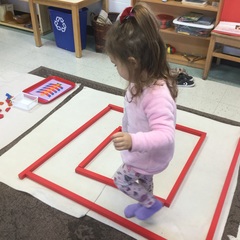By: Macleay Martinez
THE INNER CONSTRUCTION OF THE CHILD
Montessori recognized that human beings are born with potentialities rather than just with instincts that determine their behavior throughout their lives. This is a crucial factor in separating human beings from animals. It enables infants to learn the language of whatever group of people they find themselves with at birth and to adapt to the culture of that group. An infant is not Italian or English or Zambian or Indian at birth; but by the time they have turned six years of age, they are definitely Italian or English or Zambian or Indian. The potentialities present at birth, along with the power of the child’s mind to absorb from the environment makes possible this amazing inner construction on the part of the child. All of this inner construction is the work of the child and no one else. It is not the job of any outside force.
What the outside environment does contribute to the constructive work of the child is the raw material for that construction. Part of that raw material is language and culture and the child has only his or her immediate environment from which to absorb them. The culture of the environment is a powerful influence on the child. The degree of freedom experienced by the adults in the child’s environment, and the extent to which the adults act responsibly within that freedom, are part of the culture that is absorbed. In addition, the adult’s response to the child, the conditions they provide, the appropriateness of the degree of freedom they provide, all affect the psychological development of the child.
The Montessori environment enables children to build on that base and to refine and increase their ability to operate freely in a responsible manner.
THE IMPORTANCE OF THE WILL
The degree of freedom a child can handle and the child’s self-discipline build up together throughout the four planes of development. Many different aspects of the environment, the teacher’s actions, the social setting of the class, and the freedom allowed by the teacher for the child to engage in purposeful activity within that environment and social setting – should work together to support the strengthening of the child’ will – which, in turn, enables the child to act in a responsible manner.
The will, like every other function, is strengthened and developed by methodical exercise. In our method exercises of the will are incorporated with all intellectual exercises and in the everyday life of the child. Outwardly the child is learning accuracy and grace of movement, refines his sensations, learns to count and to write, but, as a more deep-seated result, he becomes master of himself, the forerunner of the man of strong, ready will. (Montessori, 1962, p. 383)
CHOICE AND THE WILL
The ability to make an appropriate choice for oneself is an essential ingredient in acting responsibly. It is an ability that must be built up over time. Children need to be allowed to exercise choice frequently during the day – every day – in order to build this skill. No one can be truly responsible if one is the prisoner of one’s whims. Choice is not superficial curiosity. Choice is a skill that needs knowledge of the possible choices along with self-discipline and the opportunity to act independently, so appropriate, responsible choices may be made.
Certainly in our system we have a different conception of discipline, we regard discipline as being an active state of things. We do not consider that discipline had been achieved when an individual has been rendered by artificial means as silent and motionless. Such an individual is annihilated, not disciplined. (Montessori, 1962)
In the Montessori environment knowledge of the possible choices comes from presentations by the teacher and observation of the activities of the other children in the environment. The ability to choose comes from repeated experiences of being able to choose. The child is helped by having limited choice at first. As the child’s ability to choose increases, the number of choices available also increases through presentations of new materials and activities by the teacher. Totally free choice is a point of arrival. It is built up through progressive degrees of freedom that are related to the child’s increasing strength of will that enables the child to act responsibly.
This long process of developing the will may be compared to the spinning of thread; developed by activity in an ever-widening field of action, the thread of will becomes stronger and stronger. (Montessori, 1963)
Freedom to choose allows children to reveal themselves. They reveal their interests and their needs. This enables adults who observe to gain information that will help them serve the children’s needs for development because they will have an idea of what lessons to give next, what kinds of experiences to provide, and how much freedom the child can be given. The ability to choose and the freedom to choose, along with the development of the will, self-discipline, independence, and responsibility, and the wish to act responsibly as a member of one’s community are all tied together. Montessori constitutes a total package of situations and experiences that support the development of the individual child within a social context.

